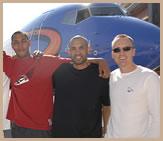By Mike Freeman, CBSSports.com National Columnist
His grandfather Malcolm McDonald was a longtime resident of New Orleans and a smart businessman who provided money and backbone to Dillard University, a historically black college that moved its campus to a temporary location on Poydras Street following Hurricane Katrina.
His mother, Janet Hill, was born in the Crescent City. She's the daughter of two professional parents who insisted segregated New Orleans was no excuse for failure. She attended Wellesley to study mathematics in the late 1960s and then received her master's degree in math education from the University of Chicago a short time later.
On Monday, Grant Hill (center) and the Suns loaded a plane with food for delivery to the Covenant House in New Orleans. Grant Hill travels across the country and world, but there remains a part of him in New Orleans each and every day. The 14-year NBA veteran spent a lot of his childhood in that city and is back often. If his soul never left, neither has his wallet, as Hill has donated significant monies pre- and post-Katrina to various New Orleans charities.
"A lot of my childhood was spent in New Orleans," Hill, currently with the Phoenix Suns, told me during a telephone interview. "It's like a second home to me."
Thus when the NBA All-Star Game festivities begin in New Orleans this week, Hill, in essence, will be returning to a practical birthplace. It has, recently, been a much different New Orleans than the one he has known, but it is home nonetheless.
There are other players in the All-Star Game with New Orleans roots, but few who have such significant and genealogical ties to the city as Hill and his family. Though Hill was not elected as an All-Star, his presence will still be felt; actually it has been and will be felt there for years to come.
Long before Hurricane Katrina, Hill founded the Malcolm McDonald Scholarship at Dillard. After the storm, he donated proceeds from the Something All Our Own tour, a collection and multi-city tour of Hill's extensive collection of African-American art, to the New Orleans Museum of Art. Hill and his wife, Tamia, also traveled to New Orleans and Baton Rouge to deliver products and spend time with the victims.
Hill has been on a mission to both help rebuild the city and, perhaps more importantly, make certain the country doesn't forget how devastated parts of New Orleans remains.
"I'm proud the NBA stayed in New Orleans and committed to playing the All-Star Game there," Hill said. "What the NBA is doing ... Commissioner Stern, (union head) Billy Hunter, the players, we want to show we haven't forgotten about New Orleans. I think the All-Star Game is a perfect way to make sure people know what's still happening there. We need to continue to tell stories of the people of New Orleans who are still struggling. That's one of the main things. Let's not forget."
Does Hill believe America has done that? Forgotten?
"There is no question to me that America has," said Hill. "I think a lot of Americans either no longer care or have forgotten about New Orleans. If it's not your reality, you don't pay attention. Once the storm was over, once the media blitz died down, people outside of New Orleans ignored New Orleans.
"It's unfortunate, it's horrible really," he said. "We talk all the time about the war and rebuilding Iraq as well as other issues every day in this country, but we don't pay attention to what's happening in our own backyard. All of the money we're putting into Iraq we should be putting into New Orleans."
To be clear: Hill isn't saying the Iraq War lacks importance. It's just that, like Hill apparently, I thought I'd never see the day in the 21st century United States where an entire city and several surrounding areas were practically wiped out, and just a short time later few people outside of those annihilated cities seem to give a damn.
The NBA can be criticized for a lot of things, but keeping the All-Star Game in New Orleans demonstrated the kind of compassion sports leagues often don't demonstrate. The NFL, for example, is using the New Orleans Saints to promote football overseas by having them play a "home" game in London. The NFL is promoting its product in another country at the expense of the city of New Orleans.
The day the Saints are gone there is going to be a nearly 70,000-seat arena, empty and cold. That's not helping the city; that's injuring it.
Moving a Saints regular-season game to London is one of the few missteps of NFL commissioner Roger Goodell's excellent young tenure.
Stern could have easily moved the game out of New Orleans, which is still fighting high levels of crime. It might have been the safe thing to do or the greedy thing to do, but it would have been the wrong thing to do.
Instead, Stern is using the All-Star Game and its high-profile players who will be both participants and spectators -- the latter like Hill, one of the game's great ambassadors -- to focus attention on New Orleans and the problems it still faces.
Hill is one of the few professional athletes who understand he can use his vast celebrity status and wealth to help change the country. Or at least a lone city for the better.
His city. Our city.
The Forgotten City.

